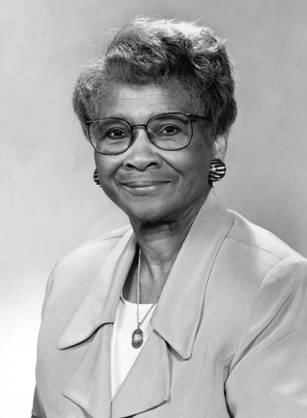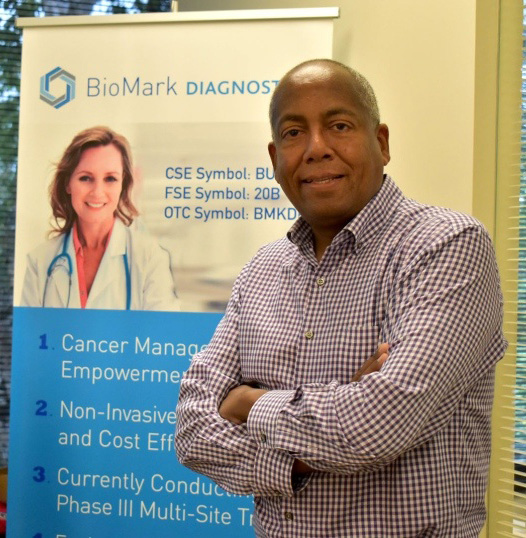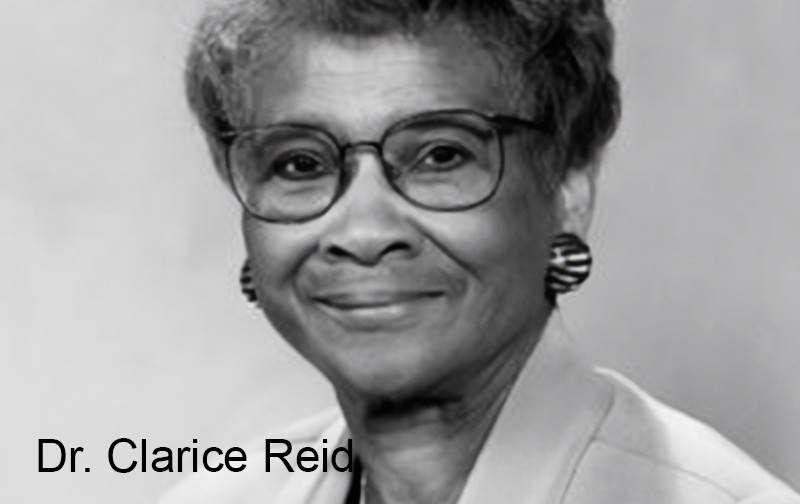Breaking Barriers
Past: Celebrating the Legacy of Dr. Clarice Reid, Pioneer in Sickle Cell Research
Current: BioMark Diagnostics Inc. Pioneering Early Stage Cancer Detection
Written by Tom Raycove, CEO Disrupted Logic Interactive Inc.
Dr. Clarice Reid: Pioneering Work in the Field of Sickle Cell Disease

Dr. Clarice Reid was a trailblazer in the field of sickle cell disease, dedicating her life and career to improving the lives of those affected by this debilitating genetic blood disorder.
As a pioneering black woman in the field of medicine and science, Dr. Reid’s work has made a significant impact on our understanding of this condition and has paved the way for the development of new treatments and therapies.
Her unwavering commitment to finding a cure for sickle cell disease and her groundbreaking contributions to the field make her a valuable part of black history, and her legacy continues to inspire future generations of scientists and healthcare providers.
During this Black History Month let us celebrates the achievements and contributions of Dr. Clarice Reid, a true leader and advocate for those affected by sickle cell disease and BioMark Diagnostics Inc. a diagnostic company focused in developing better cancer care management solutions.
The Significance of Dr Reid’s Work
Sickle cell disease is a genetic blood disorder that affects millions of people worldwide, particularly those of African descent. The disease is characterized by the production of abnormal hemoglobin, which can cause red blood cells to take on a crescent or sickle shape. This can lead to a range of health problems, including anemia, severe pain, and organ damage, as well as a reduced life expectancy.
The impact of sickle cell disease on those affected by it is profound, affecting nearly every aspect of their lives. Those with sickle cell disease often face a lifetime of chronic pain, frequent hospitalizations, and reduced opportunities for education, employment, and overall quality of life.
This is where the significance of Dr. Clarice Reid’s work comes in. As a researcher in the field of sickle cell disease, Dr. Reid dedicated her life and career to understanding this debilitating condition and finding ways to improve the lives of those affected by it. Her work helped to deepen our understanding of the biology of sickle cell disease, paving the way for the development of new treatments and therapies. Her contributions to the field have had a major impact on the world, improving the lives of those affected by sickle cell disease and inspiring future generations of scientists and healthcare providers to work towards finding a cure for this condition.
Education and Early Career
Dr. Clarice Reid was born and raised in a small, close-knit community in the southern United States. From a young age, she was interested in science and medicine, and she excelled academically throughout her childhood and teenage years. After finishing high school, she went on to study biology and chemistry at a local university, where she developed a passion for genetics and the role it plays in human health.
After earning her undergraduate degree, Dr. Reid pursued a PhD in genetics at a well-respected institution, where she focused her studies on the genetic basis of sickle cell disease. During her graduate studies, she worked alongside leading experts in the field, conducting groundbreaking research on the biology of sickle cell disease and the genetic mechanisms that contribute to this debilitating condition.
After completing her PhD, Dr. Reid accepted a postdoctoral research position at a leading medical institution, where she continued her work in the field of sickle cell disease. She quickly established herself as a leader in the field, conducting important research and contributing to a deeper understanding of the biology of this condition.
Throughout her career, Dr. Reid remained committed to improving the lives of those affected by sickle cell disease. She dedicated herself to studying this condition, with the goal of developing new treatments and therapies that could help those affected by it lead longer, healthier, and more fulfilling lives. Her tireless work in the field of sickle cell disease helped to deepen our understanding of this condition and inspired future generations of scientists and healthcare providers to work towards finding a cure.
Help Us Celebrate Black History Month By Sharing This Incredible Story
The Challenges and Obstacles Faced as a Black Woman in Science and Medicine
Dr. Clarice Reid faced a number of challenges and obstacles as a black woman in science and medicine. Despite her exceptional academic achievements and her pioneering work in the field of sickle cell disease, she often faced discrimination, prejudice, and exclusion in her professional life.

One of the major challenges she faced was the lack of representation of black women in science and medicine. Throughout her career, Dr. Reid was often the only black woman in her workplace or in her field, which made her feel isolated and excluded from professional networks and opportunities. This lack of representation also made it difficult for her to find mentors and role models who looked like her and shared her experiences.
Another obstacle Dr. Reid faced was the bias and prejudice she encountered in her work. Despite her expertise and her groundbreaking research in the field of sickle cell disease, she often had to work harder and prove herself more than her white male colleagues to be taken seriously. She also faced challenges in securing funding for her research, as many grant-making organizations and foundations were reluctant to invest in the work of a black woman in a field that was traditionally dominated by white men.
Despite these challenges, Dr. Reid persevered and continued to work tirelessly to improve the lives of those affected by sickle cell disease. Her unwavering commitment to her work, her deep understanding of the biology of sickle cell disease, and her passion for improving the lives of those affected by it, helped her overcome the obstacles she faced and make important contributions to the field. She remains an inspiration to black women in science and medicine today and a reminder of the importance of representation, diversity, and equity in these fields.
The Systemic Barriers and Discrimination Faced by Black Women in Science and Medicine
Black women have historically faced systemic barriers and discrimination in science and medicine, leading to underrepresentation in these fields. These barriers include a lack of access to quality education and opportunities, unconscious bias and racism, and systemic exclusion from funding, mentorship, and leadership opportunities. As a result, black women have been forced to navigate a number of obstacles in order to succeed in science and medicine.

Despite these challenges, Dr. Clarice Reid was able to overcome these obstacles and make important contributions to the field of sickle cell disease. She was dedicated to her work and passionate about improving the lives of those affected by this condition.
Dr. Reid navigated the barriers and discrimination she faced by working tirelessly, conducting cutting-edge research, and collaborating with colleagues and institutions that shared her passion for improving health outcomes for people of color.
Her unwavering commitment to her work and her deep understanding of the biology of sickle cell disease helped her succeed in the face of systemic barriers and discrimination. She remains an inspiration to black women in science and medicine today, and a reminder of the importance of representation, diversity, and equity in these fields. Through her work and her legacy, Dr. Reid has made a lasting impact on the health and welfare of the world, and will continue to inspire future generations of black women in science and medicine.
The Importance of Diversity in Science and Medicine

Diversity and representation play a crucial role in the advancement of science and medicine. When individuals from different backgrounds, experiences, and perspectives are included in the scientific and medical communities, it leads to a richer exchange of ideas and more innovative approaches to solving problems.
This is because people from different backgrounds bring different perspectives, experiences, and expertise to the table, which can lead to new discoveries, insights, and breakthroughs.
Moreover, diversity and representation are critical for improving health outcomes for marginalized communities. Historically, medical research and treatment have been developed without the input or consideration of communities of color, leading to disparities in health outcomes and a lack of culturally competent care. When individuals from these communities are included in the scientific and medical communities, it ensures that their unique health needs are taken into account and addressed in a meaningful way.
However, despite the many benefits of diversity and representation in science and medicine, marginalized communities continue to face barriers to entry and systemic discrimination. This is why it is crucial to celebrate individuals like Dr. Clarice Reid, who broke down barriers and made important contributions to the field despite the challenges they faced. Their stories serve as a reminder of the importance of diversity and representation in science and medicine, and inspire future generations of individuals from underrepresented communities to pursue careers in these fields.
Final Thoughts
Dr. Clarice Reid was a pioneering researcher in the field of sickle cell disease, and her work has had a profound impact on the lives of millions of people affected by this condition. Her contributions to the field of science and medicine are a testament to her determination, resilience, and passion for improving the lives of others. As we celebrate Black History Month, it is important to acknowledge the achievements and contributions of black people like Dr. Reid who have overcome systemic barriers and discrimination to make significant contributions to the fields of science and medicine.
Dr. Reid’s story is a powerful reminder of the importance of diversity and representation in these fields, and the impact that individuals from underrepresented communities can have when given the opportunity to pursue their passions. It is a call to action for all of us to learn more about the incredible achievements and contributions of black men and women in the fields of science and medicine, and to work towards creating a more inclusive and equitable future for everyone.
So let us take a moment to celebrate Dr. Clarice Reid and the many other black scientists and healthcare providers who have made important contributions to the fields of science and medicine and let us continue to work towards creating a world where everyone has the opportunity to pursue their passions and make a positive impact on the lives of others.
About BioMark Diagnostics Inc.
BioMark Diagnostics Inc. is a Canadian-based cancer diagnostic company with head office located in Richmond, British Columbia and operating lab in Quebec City, Quebec. The company focuses on discovery and commercialization of novel biomarkers using metabolomics and incorporating machine learning algorithms. The main objective of the Company is to bring new diagnostics to the market and improve cancer prognosis by allowing physicians to detect carcinomas in the pre-symptomatic stages, when approximately 90% of cancers can be cured. BioMark’s robust technology platform can also be used for measuring a patient’s response to treatment and for the ongoing surveillance for cancer recurrence. The Company’s initial focus is on early diagnosis for lung cancer using a dynamic panel of metabolites*, with plans to expand into other hard to detect and treat cancers such as brain, ovarian and pancreatic.
Rashid Ahmed, the CEO of BioMark diagnostics in Richmond, BC, is a shining example of resilience, determination, and success in the face of adversity. His journey as a black man in science and medicine is a testament to the impact of systemic barriers and discrimination faced by black people in these fields. Despite the challenges he faced, Rashid’s dedication, hard work, and determination have led him to become a successful CEO and leader in the field.

Black History Month is a time to celebrate the achievements and contributions of black people in all areas of life, including science and medicine. Rashid’s story is an important one to tell, as it sheds light on the perseverance and determination of black people in the face of obstacles and barriers. It is a reminder that black people have made, and will continue to make, significant contributions to society, regardless of the challenges they may face.
Rashid’s success is a source of inspiration for others, especially for young black people who may be considering careers in science and medicine. By sharing his story, Rashid helps to break down the barriers that prevent black people from pursuing their dreams and reaching their full potential. He serves as a role model and mentor, showing that with hard work and determination, anything is possible.
In celebrating Black History Month, we pay homage to the contributions and achievements of black men and women like Dr. Clarice Reid and Rashid Ahmed. Through their stories, we recognize the resilience, determination, and perseverance of black people, and we encourage others, regardless of race or gender, to follow in their footsteps and pursue their passions, regardless of the challenges they may face.
* Metabolites are small molecules that are produced during cellular metabolism. These are packed with information about your cellular status.
Learn More
To learn more about black men and women in science and medicine, there are a number of resources available, including books, documentaries, and online resources. Some great places to start include the National Museum of African American History and Culture, the Association of Black Scientists and Engineers, and the National Association of Black Women in Science.




